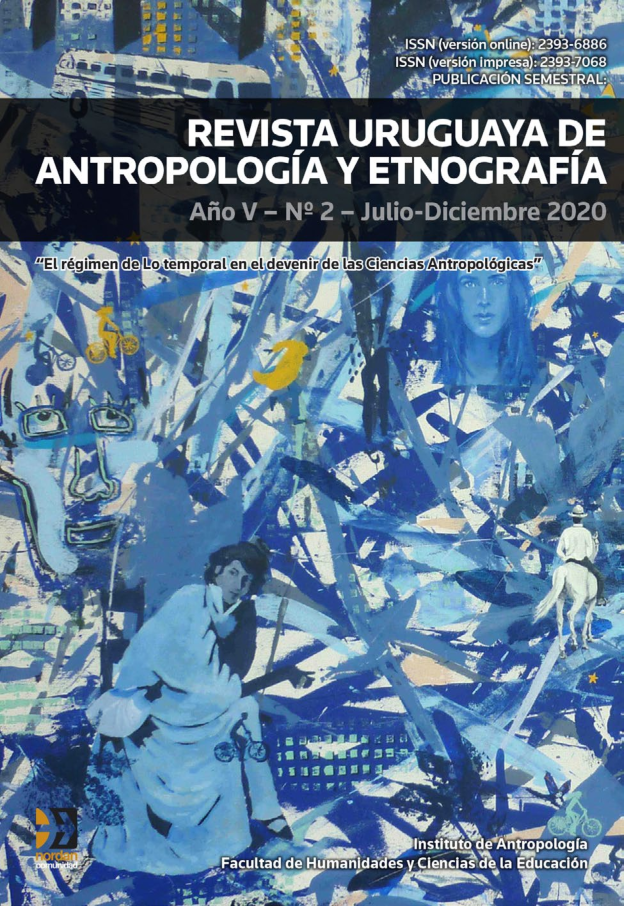Published 2020-12-26
Keywords
- Pandemia 2020,
- Uruguay,
- Antropología,
- Salud,
- Hecho social total
- Pandemic 2020,
- Uruguay,
- Anthropology,
- Health,
- Total social fact
- Pandemia,
- Uruguai,
- Antropología,
- Perícia antropológica,
- Saúde
- Fato Social Total ...More
How to Cite
Copyright (c) 2020 Sonnia Romero Gorski, Fabrizio Martínez, Fabricio Vomero, Virginia Rial, Selene Cheroni, Samuel Rodríguez, Gregorio Tabakián, Cristian Dibot, Rodrigo Abraira, Joajquín Martínez

This work is licensed under a Creative Commons Attribution-NonCommercial 4.0 International License.
Abstract
Study results that refer to the still current health emergency due to Covid-19 in Uruguay, a South
American country located between Argentina and Brazil. In terms of territory and population,
it is the smallest country in the region, which has historically approached European standards,
a trend that was selectively maintained in the context of the pandemic.
Research strategy: an ethnographic study was scheduled in a limited time, between April
and June, as soon as the health crisis began. Ten observation “antennas” were distributed, in
everyday life situations, in health institutions and others.
The bibliographic resources used respond to a search for disciplinary bases with recognized
solvency, rescuing authors and theoretical frameworks, integrating new theoretical-methodological proposals and antecedents related to this research. Motivation of the anthropological expertise: highlighting (cultural) differences in behavior during the health crisis, raising the interest in knowing about the objectification of socio-cultural
factors that influenced the containment of epidemiological progress and then, in the significant
presence of contagions within the health personnel.
Results: we found models that order the understanding of social facts, of real data. The
approach carried out contributes knowledge about representations, contents of social imaginary, which determine attitudes and affect objective conditions in the social, institutional and
personal sphere.
Downloads
References
- Agamben, G. (2009). Signatura rerum. Sobre el método. Adriana Hidalgo editora. Buenos Aires.
- Augé, Marc. (1996). El sentido de los otros. Actualidad de la antropología. Ed. Paidós Básica. Barcelona.
- Barrán, J.P., Bayce, R., Cheroni, A., de Mattos, T. Labisch, A., Moreira, H., Porzecanski, T., Portillo, J., Romero, S., Rodriguez, J., Viñar, M., (1993, 1ª reed. 2002). La Medicalización de la Sociedad. Instituto Goethe, Montevideo. Ed. Nordan Comunidad.
- Cheroni,S. Rial,V., Rodriguez, E. 99-124. Romero, S. 125-146. En Basso, C., editor. (2010). Abordaje ecosistémico para prevenir y controlar al vector del dengue en Uruguay. Universidad de la República.
- Bathyany , Carlos et al. (2020). Institut Pasteur de Montevideo. The Uruguayan Conundrum: an effective Covid-19 response in South America. Submitted to the New England Journal of Medecine, the 21 july 2020.
- Csordas,Th. (2015). Embodiment and experience. The existential ground of culture and self. Edited by Th. Csordas, 2014).
- De Castro, Viveiros, (2010 [2009, PUF]), Metafísicas caníbales. Líneas de Antropología postestructural. Katz editores, Buenos Aires.
- Chartier, R (2005). El mundo como representación. Estudios sobre historia cultural. Gedisa: Barcelona.
- Descola, Ph. (2010). Diversité des natures, diversité des cultures. Les petites conférences, Bayard, éditions Montrouge, France.
- Douglas, M. (1996). La aceptabilidad del riesgo según las ciencias sociales. Prólogo Joan Bestard. Editorial Paidós. Barcelona.
- González Vélez, C. A., García González, D. F. (2019) 73-84. In: Revista Uruguaya de Antropología y Etnografía, Año IV, N°2 www.scielo.edu.uy, www.ojs.fhce.edu.uy, https://es.unesco.org/news/revista-uruguaya-antropologia-y-etnografia-enero-junio-2020
- Latour, B. 2001 1ª ed. en esp. La esperanza de Pandora. Ensayos sobre la realidad de los estudios de la ciencia. Gedisa editorial, Barcelona.
- Levcovitz E. y otros. (2016) Salud y enfermedad en condiciones de privación de libertad:diagnóstico epidemiológico. Montevideo: OPP.
- Marcel Mauss (1991[1925]) “Ensayo sobre el don” en Sociología y Antropología, Tecnos, Madrid.
- Petit, J. M. (2019). Informe 2019 . Montevideo: Parlamento del Uruguay
- Petit, J. M. (2020). «Comisionado carcelario: Covid-19 “obliga a hacer lo que sabíamos que había que hacer y no hacíamos”» Recuperado de https://www.youtube.com/watch?v=4BnXXJ5m0eg&t=2455s >
- Pi Hugarte, R. (2000),” Santos populares del Uruguay llegados desde la Lucania”, 59-75. Anuario de Antropología Social y Cultural en Uruguay- Romero Gorski, S.(comp.), Departamento de Antropología Social, FHCE. Editorial Nordan-Comunidad, Montevideo.
- Portillo, J. y Rodriguez Nebot (comp.), (2005). Expropiación de la salud, Instituto Goethe de Montevideo, Ed. Nordan Comunidad.
- Rial, V. (2020), Uniformidad y divergencia: Covid 19 pandemia del siglo XXI, 81-88. Revista Uruguaya de Antropología y Etnografía. www.scielo.edu.uy, www.ojs.fhce.edu.uy, https://es.unesco.org/news/revista-uruguaya-antropologia-y-etnografia-enero-junio-2020
- Rodríguez Soto, L. (2017) El Uso del Peritaje Cultural-Antropológico como Prueba Judicial en América Latina: Reflexiones de un Taller Internacional, 103-112. Revista Uruguaya de Antropología y Etnografía, II (1).
- Romero Gorski, S. (1999). Caracterización del campo de la salud en Uruguay. Salud Problema, 4(6) junio 1999, pp. 25-35. Universidad Autónoma Metropolitana-Xochimilco.
- Romero Gorski, S., (2009), 46-51. Conclusiones del estudio antropológico puntual efectuado en el departamento de Salto. Boletín de la Academia Nacional de Medicina del Uruguay. Volumen XXVI, 2009. Montevideo, ROU. Ministerio de Educación y Cultura. Academia Nacional de Medicina.
- Romero Gorski, S. (2019). Pericia cultural: padecimientos y riesgos vinculados a lo institucional en servicios de Salud”. Ponencia en Mesa 32 de la XIII RAM, Reunión de Antropología del MERCOSUR, Porto Alegre, 23 de julio 2019.
- Sperber, Dan, (2000) Quelques outils conceptuels pour une science naturelle de la société et de la culture, Traducido del inglés por Louis Queré. Publicado en Raisons Pratiques, 2000






